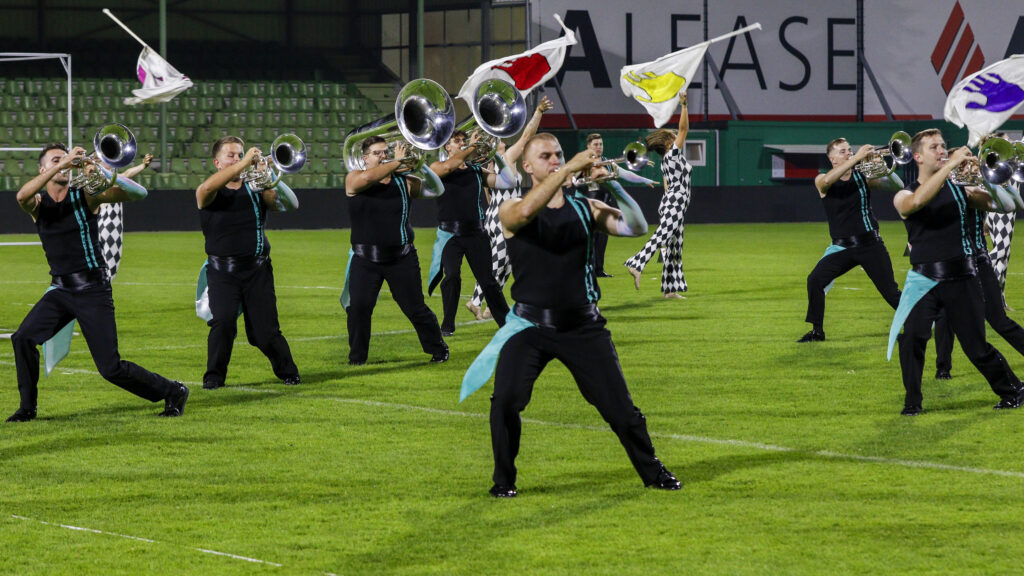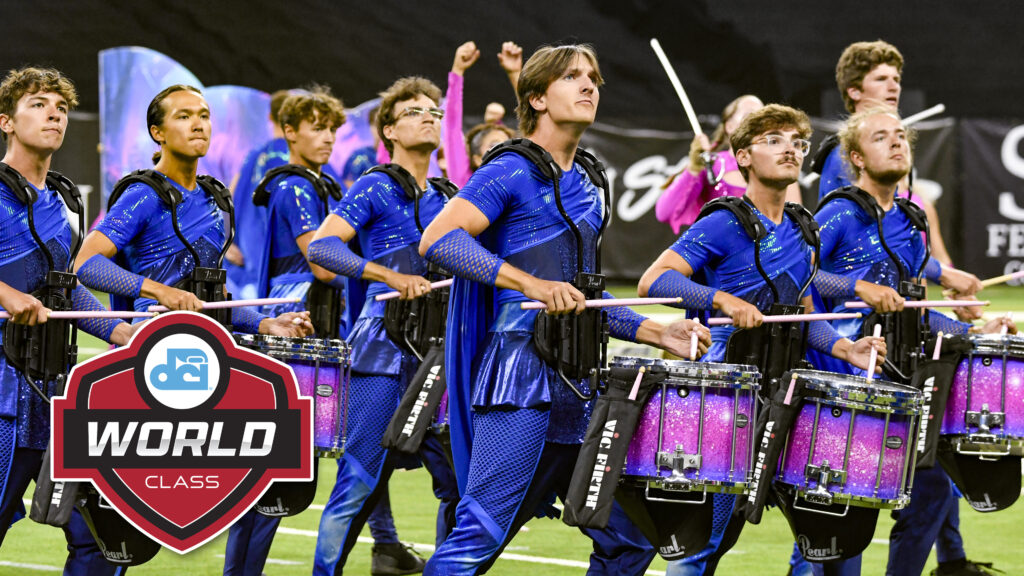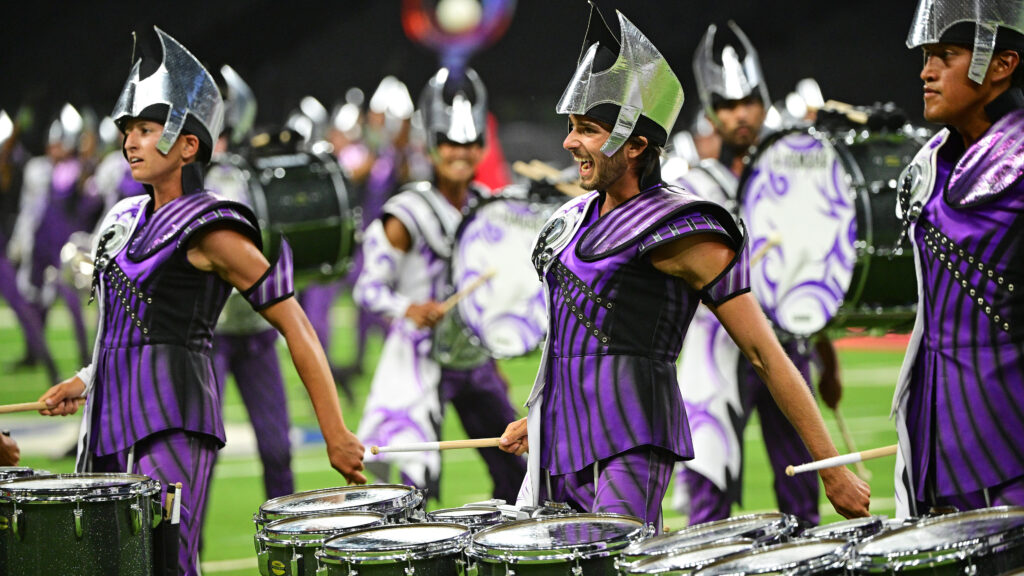The 2005 Drum Corps International World Championships marked the second time the season-ending event went to the Boston suburb of Foxboro. However, it was the first time for Gillette Stadium, which had been raised in the parking lot of the smaller Foxboro Stadium since the 1994 World Championship event.
The Cadets grabbed the 2005 Championship title, while matching the record high score of 99.15 set by The Cavaliers just four years earlier.
Among the other notable entries from the 2005 history books was Santa Clara Vanguard’s eighth-place finish, the corps’ lowest. Madison Scouts featured a female guest dancer in “The Carmen Project,” and Phantom Regiment featured a male guest dancer in its Gershwin “Rhapsody” show, the first time a male had participated in the corps’ color guard section. The Bluecoats earned their highest placement yet, finishing in fifth.
After a California show on June 18, fans in the United States didn’t see the Blue Devils until the DCI Central Championship in Kalamazoo, Michigan on July 15, due to an extended trip to Europe.
The corps’ fourth-place show, “Dance Derby of the Century,” was named after New York City’s Madison Square Garden marathon of 1928, where a huge number of pairs of dancers—hoping to earn a large payout—were pitted against each other in a grueling, days-long contest to see who could stay on their feet the longest. To keep the event interesting to the spectators, various vaudeville acts and other live entertainment was offered throughout. The NYC event ran a remarkable 20 days and ultimately was terminated by a public health inspector, resulting in the eight couples still barely functioning agreeing to split the prize money that totaled only $5,000 (about $70,000 in today’s dollars).
While the show was inspired by the dance marathon, it was run in reverse, like watching a movie backward. The concept was borrowed from an earlier Winter Guard International championship-winning show by California’s James Logan High School, which had been written and taught by Blue Devils’ guard designer Scott Chandler.

As the show evolved, the guard’s dance participants actually became more animated and lively, transforming from showing signs of lethargy to gleefully throwing down the “latest” 1920s jazz dance movements.
As these marathons had announcers to keep the dancers focused and also to entertain the crowds of onlookers, the corps also had an announcer who introduced the dance pairs and mentioned the cities where they lived. Throughout the season, Blue Devils’ dancers were often identified to the audience as coming from cities that interestingly were also the hometowns of members of the DCI judges at each particular show.
The show included a variety of dance music interspersed among the major music selections. As the show began with a hint of Leonard Bernstein’s “Prelude, Fugue and Riffs,” emergency cots were seen up on the front sideline and many of the guard’s paired dancers appeared tired and ready to collapse. It wasn’t uncommon during these marathons that one partner would sleep while the other dragged him or her around the floor.

Next was John Mackey’s “Redline Tango,” named after the New York “Red Line” subway that runs by the composer’s apartment, though “redlining” is also a term that refers to pushing an engine to its limits, which is appropriate to what the marathon dancers were experiencing. Especially fascinating in this section were the paired rifle and saber tosses, which were thrown to what could have been the rafters of Madison Square Garden. Moving backward toward the start of the marathon, the dancers were slowly becoming more animated.
“On the Town” is the hit Broadway musical that originally started its life as Leonard Bernstein’s 1944 ballet, “Fancy Free,” about three sailors on leave in New York who were at once trying to get into trouble and trying to stay out of it. Brass players joined fatigued dancers on the cots, performing from a variety of prone and sitting positions that had to be much more difficult than it looked.
The next selection, “In Wartime,” was written in 2002 by David Del Tredici, inspired by his witnessing the collapse of the World Trade Center and the military action soon taken against the Taliban. It quotes from both “Abide With Me” (often sung at Christian funerals) and Persian melodies.
“Brother, Can You Spare A Dime,” by Jay Gorney and EY Harburg, is one of the most famous tunes to come out of the Great Depression, written for the 1932 musical, “Americana” and based on a Russian Jewish lullaby. It helped capture the sadness and futility that most of the dancers experienced during their ordeal.
A return of “Prelude, Fugue and Riffs” explored the piece in much greater detail. The dancers, via Blue Devils’ backward time machine, became livelier and found an energy that could have powered all of Manhattan, ending with the announcer asking both the dancers and audience if they were ready for the marathon to begin.
2005 World Championship Finals Awards Ceremony

Michael Boo was a member of the Cavaliers from 1975-1977. He wrote about the drum corps activity for more than 35 years while serving as a staff writer for various Drum Corps International projects. During his lifetime Boo wrote for numerous other publications including an honors-winning book on the history of figure skating. He also was an accomplished composer. Boo passed away in 2020 and was inducted into the DCI Hall of Fame posthumously in 2021.





